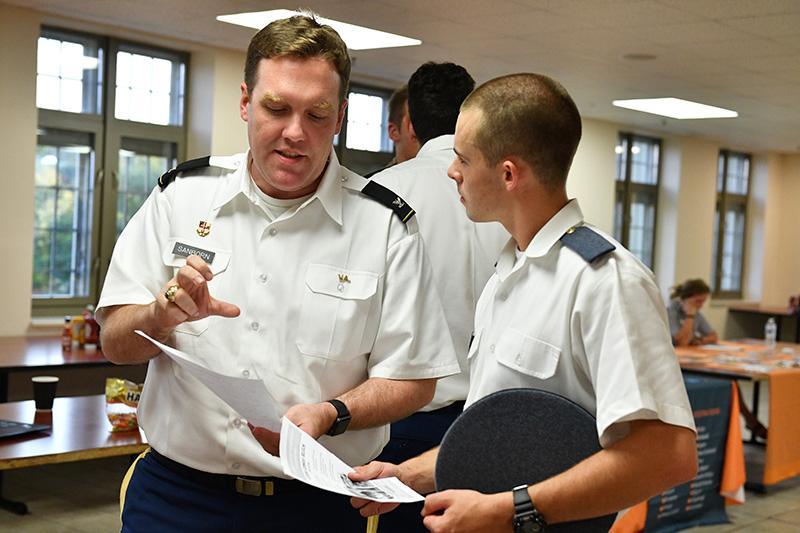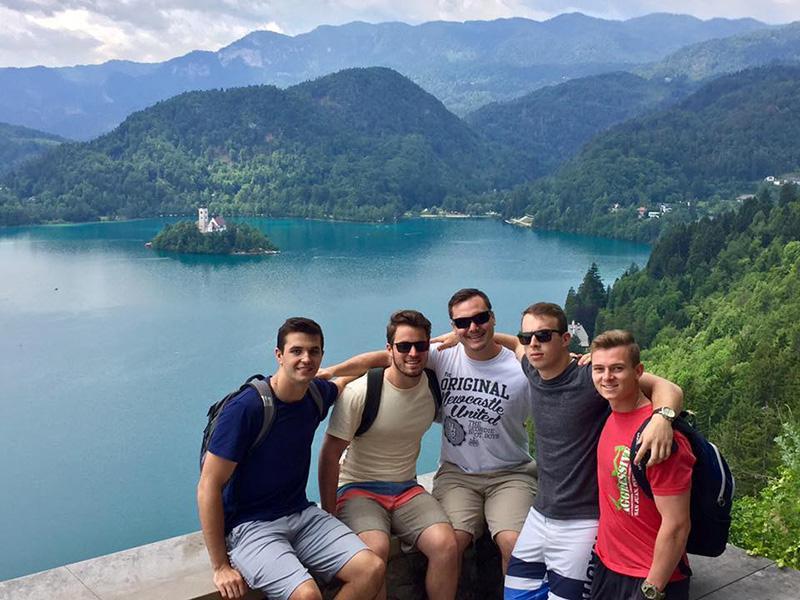Faculty Develop Interdisciplinary Study Abroad Opportunity
 |
|---|
|
Col. Howard Sanborn, professor of international studies, talks with a cadet during the study abroad fair Sept. 20.—VMI Photo by Kelly Nye. |
LEXINGTON, Va., Nov. 8, 2018—Next summer, there will be a new opportunity for cadets interested in study abroad—and a cross-departmental one at that.
“The Economics and Politics of the European Union,” to be held June 1-22, 2019, will take cadets through Slovenia, Germany, and Belgium. Leading the trip will be Lt. Col. Valentina Dimitrova-Grajzl, associate professor of economics and business; Col. Tinni Sen, professor of economics and business; and Col. Howard Sanborn, professor of international studies and political science.
The new trip, which the organizers hope will attract 13 to 15 cadets, is designed to complement the Institute’s existing summer study abroad options. For many years, VMI has offered summer language study in Europe—and there’s also a yearly trip to Germany for cadets majoring in engineering, along with a program focusing on Central Europe.
“[This program is] really going to be focusing on the concept of the European Union,” said Dimitrova-Grajzl.
She explained that the impetus for the new program came from a conversation with Col. Dave Hall, director of international programs. “He indicated that he would like to have more programs … a bigger variety of programs for cadets, and so we thought of putting this program together, since [there’s been] no program focusing on economics and international relations,” she said.
While in Europe, cadets will have the chance to take two out of three offered classes and earn six credits in the process.
Dimitrova-Grajzl will teach “The Economics of Transition and Institutional Development of the New EU Member States.” A native of Bulgaria, she has personal ties to the region, first-hand experience of the transition from socialism to capitalism in two countries—Bulgaria and Slovenia—and professional experience as a professor at the Central European University in Hungary.
 |
|---|
| Cadets pause at Lake Bled, Slovenia, during a study abroad trip led by Lt. Col. Valentina Dimitrova-Grajzl in 2017.—Photo courtesy of Valentina Dimitrova-Grajzl. |
Sen will teach “Understanding International Finance through the Lens of the European Union.” Sanborn’s course will be “Public Opinion Research in Europe.”
Sanborn typically teaches courses having to do with Asia, but he jumped at the chance to teach in—and about—a different region of the world. “A lot of my research ends up being quantitative,” he noted. “Thinking about some of these issues in Asia, it’s readily applied to places like Europe.”
With only 21 days on the ground, the group will move quickly. In Slovenia, one of the newest members of the EU, cadets will study the history of the region and its transition from socialism to capitalism. From there, they’ll travel to Munich, Germany, and visit the nearby Dachau concentration camp, where over 200,000 Jews were imprisoned during World War II and nearly 32,000 died.
The professors stressed that the trip to Dachau isn’t just a history lesson—it’s intimately connected to the ongoing European refugee crisis.
“We thought [the trip to Dachau] would be in the context of what’s going on with migration,” said Dimitrova-Grajzl. “Since the second World War, this is the largest migration of refugees [into Europe],” added Sen.
From Munich, cadets and professors will travel to Frankfurt, Germany, site of the European Central Bank. While in Frankfurt, they’ll also visit an organization with ties to Gen. George C. Marshall, VMI Class of 1901. The Marshall European Center for Security Studies is a German-American partnership designed to promote peaceful solutions to transnational and regional security challenges.
From Frankfurt, the group will head to Brussels, Belgium, where they’ll tour the European Parliament and NATO headquarters.
Throughout the trip, cadets will learn not only from the three professors, but also European academics and policy makers. Among the line-up of guest speakers are a former finance minister of Slovenia, an official with the World Bank, and a former member of the European Parliament.
“The students are going to get exposed to learning in a while lot of different ways,” said Dimitrova-Grajzl. “Some of it will be lectures, some of it will be discussion, some of it will be experiences, some of it will be interacting with people on the street.”
Sen also stressed the interdisciplinary nature of the trip.
“What’s most attractive about this program to me is that it’s across departments,” she said. “That’s part of the idea of a liberal arts education. You’re looking at an idea and you’re looking at the politics of it, you’re looking at the economics of it …. Howard’s going to be talking about research with data.”
And, of course, there’s the countries themselves, lending a breadth and depth that the standard classroom experience never could. Said Sen, “You’re immersed in this place and you see it as a cohesive whole, rather than two different classes that [cadets] could take.”
-Mary Price
—VMI—
.svg)
.png)